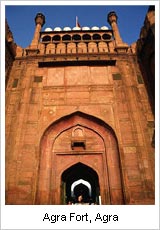Introduction:
Itmad-Ud-Daulah's Tomb is a Mughal mausoleum in the city of
Agra in the Indian state of Uttar Pradesh . Often described
as 'jewel box', sometimes called the Baby Taj , the tomb of
Itmad-Ud-Daulah is often regarded as a "draft" of
the Taj Mahal. The tomb of Itmad-ud-Daulah is as interesting
as the life of the person for whom it was built. Mirza Ghiyas-ud-din
or Ghiyas Beg (later known as Itmad-ud-Daulah) was a poor
merchant and lived in Persia (modern-day Iran). Itmad-ud-Daulah
was buried in a tomb that resembles a jewel box and set in
a garden. This tranquil, small, garden located on the banks
of the Yamuna was to inspire the construction of the Taj Mahal
in the later years. It is the first tomb in India built entirely
in white marble. The tomb is also justly famous for the glorious
pietra dura (stone inlay) decoration depicting cypresses,
wine glasses, and an amazing variety of geometrical arabesque.
The jali screens set in arched recesses are splendid. Four
small minarets rise at the four corners of the small tomb
structure. The whole structure gives the impression of an
enlarged precious object. Due to the profusion of intricate
work done on marble and the beautiful marble screen-work,
the tomb easily qualifies as a veritable forerunner of the
famous Taj Mahal.
The pure white and elaborately carved tomb of Itmad-ud-Daulah
conforms to the Islamic style of architecture. The use of
arched entrances, octagonal shaped towers or minarets, use
of exquisitely carved floral patterns, intricate marble-screen
work and inlay work are all representative of the Islamic
style. The absence of a dome and the presence of a closed
kiosk on top of this building and the use of chhatris (small
domed canopies, supported by pillars) atop the four towers
(minarets) instead of proper domes are reflective of local
influence. The walls are white marble from Rajasthan encrusted
with semi-precious stone decorations - cornelian , jasper
, lapis lazuli , onyx , and topaz in images of cypress trees
and wine bottles, or more elaborate decorations like cut fruit
or vases containing bouquets. Light to the interior passes
through delicate jali screens of intricately carved white
marble.
|
|
 |

